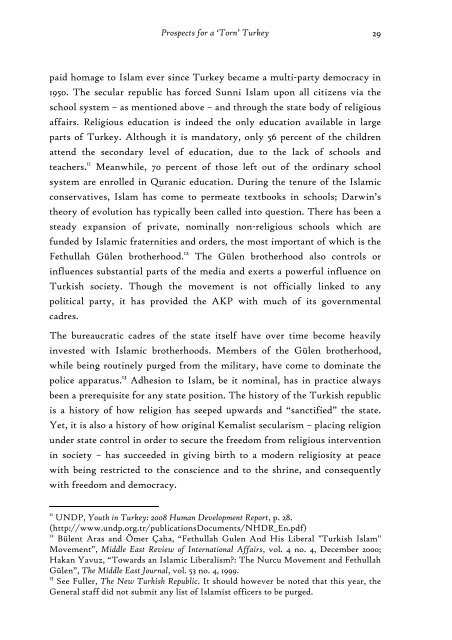2008_10_SRP_CornellKaraveli_Turkey
2008_10_SRP_CornellKaraveli_Turkey
2008_10_SRP_CornellKaraveli_Turkey
Create successful ePaper yourself
Turn your PDF publications into a flip-book with our unique Google optimized e-Paper software.
Prospects for a ‘Torn’ <strong>Turkey</strong> 29<br />
paid homage to Islam ever since <strong>Turkey</strong> became a multi-party democracy in<br />
1950. The secular republic has forced Sunni Islam upon all citizens via the<br />
school system – as mentioned above – and through the state body of religious<br />
affairs. Religious education is indeed the only education available in large<br />
parts of <strong>Turkey</strong>. Although it is mandatory, only 56 percent of the children<br />
attend the secondary level of education, due to the lack of schools and<br />
teachers. 11 Meanwhile, 70 percent of those left out of the ordinary school<br />
system are enrolled in Quranic education. During the tenure of the Islamic<br />
conservatives, Islam has come to permeate textbooks in schools; Darwin’s<br />
theory of evolution has typically been called into question. There has been a<br />
steady expansion of private, nominally non-religious schools which are<br />
funded by Islamic fraternities and orders, the most important of which is the<br />
Fethullah Gülen brotherhood. 12 The Gülen brotherhood also controls or<br />
influences substantial parts of the media and exerts a powerful influence on<br />
Turkish society. Though the movement is not officially linked to any<br />
political party, it has provided the AKP with much of its governmental<br />
cadres.<br />
The bureaucratic cadres of the state itself have over time become heavily<br />
invested with Islamic brotherhoods. Members of the Gülen brotherhood,<br />
while being routinely purged from the military, have come to dominate the<br />
police apparatus. 13 Adhesion to Islam, be it nominal, has in practice always<br />
been a prerequisite for any state position. The history of the Turkish republic<br />
is a history of how religion has seeped upwards and “sanctified” the state.<br />
Yet, it is also a history of how original Kemalist secularism – placing religion<br />
under state control in order to secure the freedom from religious intervention<br />
in society – has succeeded in giving birth to a modern religiosity at peace<br />
with being restricted to the conscience and to the shrine, and consequently<br />
with freedom and democracy.<br />
11 UNDP, Youth in <strong>Turkey</strong>: <strong>2008</strong> Human Development Report, p. 28.<br />
(http://www.undp.org.tr/publicationsDocuments/NHDR_En.pdf)<br />
12 Bülent Aras and Ömer Çaha, “Fethullah Gulen And His Liberal "Turkish Islam"<br />
Movement”, Middle East Review of International Affairs, vol. 4 no. 4, December 2000;<br />
Hakan Yavuz, “Towards an Islamic Liberalism?: The Nurcu Movement and Fethullah<br />
Gülen”, The Middle East Journal, vol. 53 no. 4, 1999.<br />
13 See Fuller, The New Turkish Republic. It should however be noted that this year, the<br />
General staff did not submit any list of Islamist officers to be purged.


